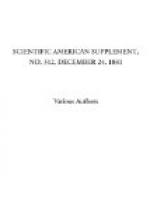I now come to the very last subject I propose to speak upon, and that is
PRINTING MACHINERY,
and especially as applied to the printing of newspapers. In 1831, we had the steam press sending out a few hundred copies in an hour, and doing that upon detached sheets, and thus many hours were required for an edition of some thousands. The only way of expediting the matter would have been to have recomposed the paper, involving, however, double labor to the compositors, and a double chance of error. At the present day, we have, by the Walter press, the paper printed on a continuous sheet at a rate per hour at least three times as great as that of the presses of 1831, and, by the aid of papier mache moulds, within five minutes from the starting of the first press, a second press can be got to work from the stereotype plates, and a third one in the next five minutes; and thus the wisdom of our senators, which has been delivered as late as three o’clock in the morning, is able to be transmitted by the newspaper train leaving Euston at 5:15 A.M.
This is the last matter with which I shall trouble the Section. I have purposely omitted telegraphy; I have purposely omitted artillery, textile fabrics, and the milling and preparation of grain. These and other matters I have omitted for several reasons. Some I have omitted because I was incompetent to speak upon them, others because of the want of time, and others because they more properly belong to Section A.
I hope, sir, although your address, dealing with the future, was undoubtedly the right address for a president to deliver, and although it is equally right that we should not content ourselves with merely looking back in a “rest and be thankful” spirit at the various progress which this paper records, it may nevertheless be thought well that there should have been brought before the section, in however cursory a manner, some notice of mechanical development during the past fifty years.
* * * * *
[Continued from supplement, No. 311, page 4954.]
AMATEUR MECHANICS.
Metal turning.
In selecting a lathe an amateur may exercise more or less taste, and he may be governed somewhat by the length of his purse; the same is true in the matter of chucks; but when he comes to the selection or making of turning tools he must conform to fundamental principles; he must profit as far as possible by the experience of others, and will, after all, find enough to be learned by practice.




